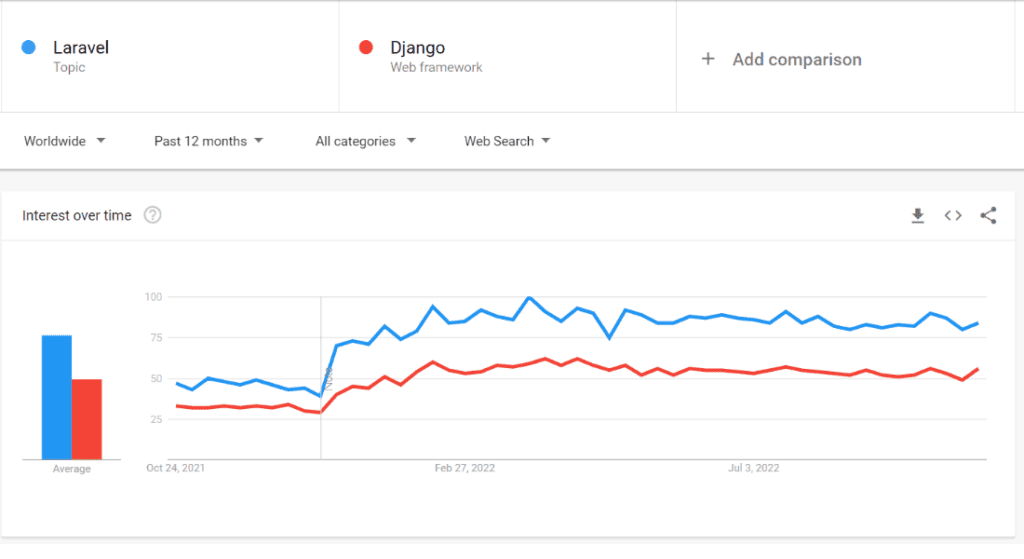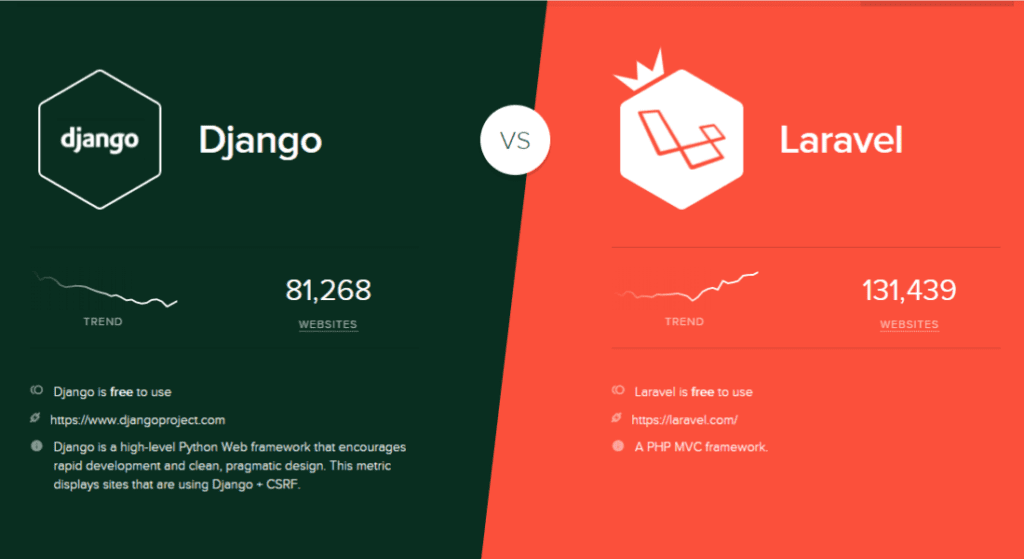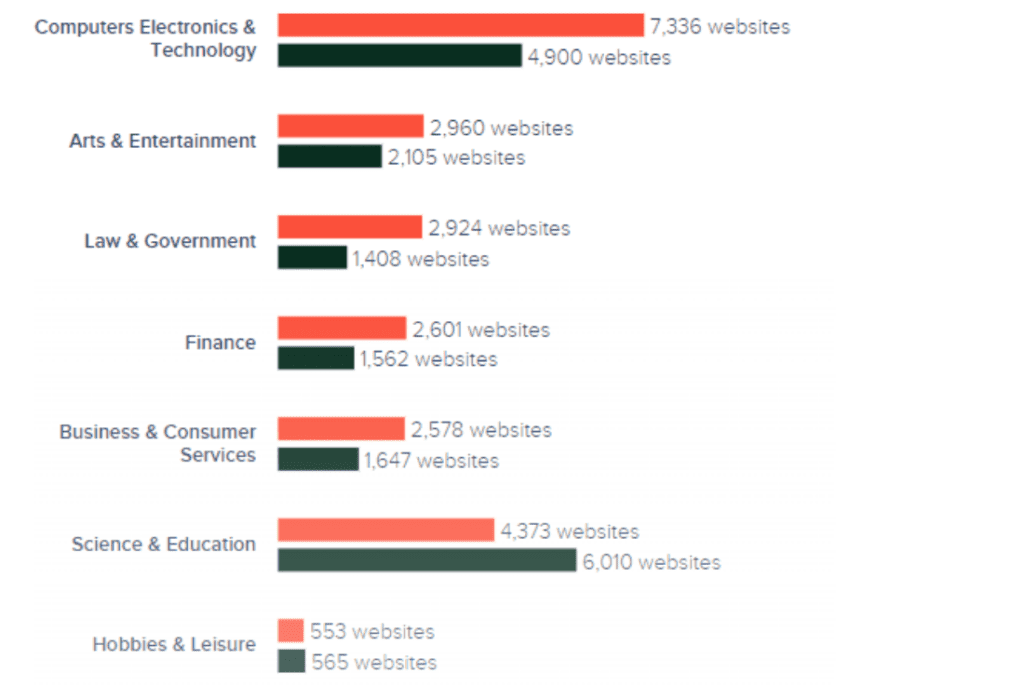In this blog post, the topic of Laravel vs Django for backend development is discussed thoroughly. Business owners want an app that aligns with market trends and can grow with their business. The article covers aspects such as performance, popularity, scalability, microservices compatibility, and more. It also highlights the best use cases for each framework to aid in app development decisions and provide valuable guidance on why developers should choose Laravel web app development over Django.
Choosing the right framework for backend development can be a continuous challenge, with several options available. Among them, Django and Laravel are considered the most popular. Before we delve into a comparison between the two, let’s have an overview of Django versus Laravel.
Also, it’s important to determine Laravel framework is better because it helps developers make informed decisions about which tool is more suitable for their specific project needs, goals, and requirements. After all, the right framework choice can greatly impact the success, efficiency, and scalability of a project.
Django and its Features
Django is an open-source, high-level backend framework written in Python. It is licensed under a 3-clause BSD (Berkeley Software Distribution) license and uses an MVT architecture that encourages fast development, efficient coding with a pragmatic design, and built-in database support for SQLite.
Features of Django
The main goal of Django is to simplify the development of complex web applications in a shorter amount of time. Like Laravel, it has several features that support this objective. Some of the key features of Django include:
- Free and open source
- High performance
- Scalable
- Flexible and versatile
- Strong security
- Active community
- Comprehensive features
Laravel and its Features
Laravel is an open-source PHP-based web framework known for its server-side processing, HTML authentication, templating, and other features. It follows an MVC architecture, enabling you to build pre-defined structures, modifiable backend logic, full-stack apps, and web projects with features such as routing, sessions, caching, and more. Laravel also allows you to manage SaaS products.
Laravel incorporates several features commonly found in PHP frameworks such as CodeIgniter, Yii, and even languages like Ruby on Rails. It also includes features that reduce development time. Product owners familiar with Core PHP and Advanced PHP can work efficiently with Laravel web app development, saving time compared to building a website from scratch. Additionally, the web apps built with Laravel are highly secure.
Features of Laravel Framework
Laravel has a diverse range of features that allow product owners to easily create apps with unique functionalities. Here are a few of them:
- Libraries and modularity
- Templating engine
- Artisan command line tool
- Reverse routing
- MVC architecture support
- Database seeding
- Localization and validation
- File system
- Application logic
These are some of the features of Laravel. You can learn more about them based on your project requirements.
This is a basic overview of both frameworks and the extensive features they offer to business owners.
Basic Comparison between Laravel and Django
- Language: Laravel is written in PHP while Django is written in Python.
- Architecture: Laravel follows the MVC architecture, while Django follows the MVT (Model-View-Template) architecture.
- Performance: Both frameworks are optimized for high performance, but Django is considered to have better performance for larger and more complex projects.
- Learning Curve: Laravel is considered to have a relatively gentle learning curve compared to Django, which has a steeper learning curve but is also considered to be more powerful.
- Community: Laravel has a large and active community of developers, while Django also has a large and supportive community.
- Security: Both Laravel and Django place a strong emphasis on security, but Django is considered to have more robust security features out of the box.
- Scalability: Both Laravel and Django are highly scalable, but Django is considered to be easier to scale as it has a more modular architecture.
This is just a basic comparison and there are other factors to consider when choosing between Laravel and Django, such as project requirements, budget, and team skillset.
In-Depth Comparison Showing How Laravel is Better Than Django
Both Laravel and Django have established a significant presence in the industry and have experienced substantial growth. However, according to Github, Laravel has 71.2k stars and 23k forks, and Django has 66.9k stars and 28k forks.
Google Trends also indicates a significant increase in popularity among product owners for both frameworks.

According to SimilarTech, both Laravel and Django are equally popular, with Laravel being utilized by approximately 133,542 websites, 95,502 of which are on unique domains. Meanwhile, Django is used by 81,482 websites, with 49,948 of those being on unique domains.

Looking more closely at the comparison of Laravel vs. Django popularity, it appears that Laravel is more favored in industries such as Computer Electronics & Technology, Arts & Entertainment, Law & Government, Finance, and Business & Consumer Services.

Looking into their market share, it is clearly visible that Django is lagging behind Laravel as per Similar Tech.

Does Laravel Give Better Performance Than Django?
Performance is a critical aspect of any web application. A slow or time-consuming app is not appealing to users. When it comes to performance comparison between Django and Laravel, factors such as hardware resources, storage space, and memory can have an impact on the performance of your application. Selecting the wrong framework can negatively affect the performance of your app and harm your market credibility.
Application Architecture
A flexible framework is always preferable to a rigid one with many restrictions. It is advisable to view a framework as a guide rather than a strict rule or method. With this in mind, let’s examine Django and Laravel.
Laravel adopts an MVC architecture that helps product owners divide their workload for a streamlined development process. This provides complete control over the web app and allows for rapid changes without impacting other sections. Additionally, the MVC architecture facilitates the integration of external APIs and the reuse of app logic in Laravel. While a separate, robust app backend support can be created, it may prove difficult to modify and may not be suitable for developing larger apps.
Community
Laravel and Django both have strong communities that provide support to product owners during the development process. However, the Laravel community stands out with its 46k active users, 18k threads, 71.2k Github Stars, and 23k Github Forks. The community is highly active, with most queries being resolved within a maximum of three days. Additionally, the Laravel community is known for sharing Laravel podcasts, news, documents, repositories, and more. On the other hand, the Django community, with 82k members on Reddit, 66.9k Stars, 28k Forks on Github, and approximately 250k questions tagged in StackOverflow, is also growing rapidly. Both communities are readily available for assistance, but the quick response time and active nature of the Laravel community make it a stronger choice for product owners.
REST API
Laravel stands out as the better choice for projects requiring API integration, due to its built-in support for REST APIs. In contrast, Django does not have any inbuilt features for building APIs and requires the use of a third-party library. Laravel returns queries in JSON format by default, providing an easier and more seamless integration process. This highlights the advantage of choosing Laravel over Django for projects requiring robust and efficient REST API support.
Supported Libraries
Comparing the available libraries for both Laravel and Django, it is much visible that Laravel has a more comprehensive suite of pre-installed and Object-Oriented Libraries. Laravel’s packages, like Spatie, Laravel Debugbar, Entrust, and Socialite, aim to improve the performance of the application, while Django relies on third-party libraries such as Django Rest Framework, Django-cors-headers, Django Filters, and Django Storages. Laravel’s strong set of libraries and in-built features provide a better environment for building web applications compared to Django’s approach of relying on third-party packages.
Other Technical Reasons That Shows Laravel Can Perform Better Than Django
- Templating Engine: Laravel has a more advanced templating engine, Blade, that allows for more intuitive and easy-to-read code.
- Eloquent ORM: Laravel’s Eloquent ORM provides an intuitive and easy-to-use query builder, making it easier to work with databases.
- Artisan CLI: Laravel includes a command-line interface (CLI) called Artisan, which provides a suite of helpful commands for managing and developing Laravel applications.
- Routing System: Laravel provides a simple, intuitive routing system that allows developers to define routes and handle HTTP requests in a more efficient way.
- Middleware: Laravel’s middleware system provides a convenient way to filter HTTP requests and perform various operations before and after requests.
- Easy Unit Testing: Laravel’s testing features allow developers to write and run tests for their applications with ease, making it easier to maintain and improve code quality.
When To Chose Laravel?
Laravel is a great choice for various web development projects as it provides many functionalities that can simplify and optimize the development process. It is suitable for:
- Building web apps hosted as a service – Laravel provides a simple and efficient way to build web apps that can be hosted as a service, making it an ideal choice for this type of project.
- Building interactive website layouts – Laravel has a built-in UI builder that makes it easier to build interactive and user-friendly website layouts.
- Building websites that offer on-demand videos – Laravel has features that support video streaming and make it easier to build websites that offer on-demand video content.
- Creating an advanced app without adding overhead components or additional costs – Laravel offers a variety of features that allow you to build advanced web applications without the need for additional components, thus reducing the cost and complexity of the development process.
- Building a web application for e-learning – Laravel has features that make it suitable for building e-learning platforms, as it provides easy integration with online learning tools and resources.
- Building stock trading web management systems – Laravel is suitable for building stock trading web management systems due to its robust and secure architecture, which ensures the reliability of financial transactions.
- Building reward and recognition featured apps – Laravel has features that support the development of apps that offer rewards and recognition to users, making it a good choice for this type of project.
- Creating multilingual CMSs – Laravel has inbuilt support for multilingual content management systems, making it easier to build websites that cater to a global audience.
- Building a performance monitoring app for website-hosted computers – Laravel has features that allow you to build a performance monitoring app for website-hosted computers, ensuring the reliability and performance of your web application.
Final Thoughts
Laravel web application development is a great choice for businesses looking for advanced, feature-rich and cost-effective solutions for their web-based applications. With its comprehensive set of libraries and versatile nature, Laravel app development services can help businesses create everything from interactive websites to performance-monitoring apps. To make the most of the Laravel platform, it’s recommended to work with a trusted Laravel app development company. A reliable Laravel application development company like Cubet Technolabs can provide the technical expertise and experience required to bring your project to life and ensure its success. So, if you are looking for a powerful and flexible platform for your web application development needs, consider Laravel and partner with a trusted Laravel development company today.
Have a project concept in mind? Let's collaborate and bring your vision to life!
Connect with us & let’s start the journey
Share this article

Get in touch
Kickstart your project
with a free discovery session
Describe your idea, we explore, advise, and provide a detailed plan.


























